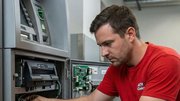News
A marriage made in heaven?
NCR and Tidel Engineering have finally tied the knot, and NCR's decision to operate Tidel as a subsidiary is likely to get no objections from the industry.
January 4, 2006
After months of negotiation and paperwork, NCR Corp. has completed its acquisition of Tidel Engineering LP, a Carrollton, Texas-based manufacturer of retail-oriented ATMs popular with independent sales organizations.
 |
Keep up-to-date on the latest ATM news. Sign up forfree, twice-weekly e-mail alerts   |
 |
Corporate shareholders of Tidel Technologies Inc., Tidel Engineering's parent, approved the $10.2 million deal Dec. 28. (Read also With Tidel in its quiver, will NCR have a new shot at retail?) The expected agreement was announced in February 2005 but took nearly a year to finalize while Tidel worked to get its financial filings up to date. The last financial filing for the company posted Dec. 7. (Read also, NCR, Tidel enter agreement for expected acquisition.) Prior to November, Tidel had not filed financials with the Securities and Exchange Commission since 2001.
NCR also announced in February that it expected to hire two "key" Tidel executives. But the two companies told ATMmarketplace that Mike Hudson, Tidel Engineering's former executive vice president and chief operating officer, will be the only "key" executive from Tidel to join the new NCR subsidiary, NCR EasyPoint ATM LLC.
 |
NCR's EasyPoint 62 is a compact unit designed for retail locations and financial institutions. |
No mention was made regarding the other executive - believed to be Tidel Engineering president and chief executive officer Mark Levenick. Sam M. Ditzion, president and CEO of Boston-based Tremont Capital Group, an advisory firm that focuses on mergers and acquisitions within the ATM industry, told ATMmarketplace that he suspects Levenick, who also serves as the CEO and COO of Tidel Technologies, is likely to stay with Tidel Technologies until the rest of the company is sold off.
Fifty-seven Tidel Engineering employees are following Hudson to NCR, including Jane Hollingsworth, who will be the director of customer service, technical service and training organizations for the new subsidiary.
NCR EasyPoint ATM LLC, which will operate as a separate NCR entity, will be led by Hudson, who's been named the subsidiary's general manager. NCR's EasyPoint product line will be transitioned to the subsidiary, where it will be integrated with Tidel's 3000 series, said Brad Lozier, vice president of product management for NCR's Financial Solutions division. The new product line will initially be marketed as the Tidel EasyPoint ATM.
"The product managers of EasyPoint, those with long-term NCR experience, will be working for Mike, and he'll have the ability to work with these product managers to expand and develop products," Lozier said.
A market difference
When word of NCR's expected acquisition of Tidel Engineering hit the street last year, industry observers weren't surprised. Although a king in the financial-institution space, NCR was never able to penetrate the lucrative ISO-dominated retail market. And Tidel, which for years had struggled to pull itself from the depths of debt it incurred after the Credit Card Center debacle, was ripe for the buy. (Read also, Tidel amends credit line and 2001: The year in ATMs.)
From 2000 to 2001, 70 percent of Tidel's machines were going to CCC. The downfall of CCC forced Tidel to write off $25 million in 2001, and eventually led the company to borrow $6.7 million from Laurus Master Fund Ltd. - a debt that increased by nearly $2 million because Tidel could not meet loan-payment obligations, according to one SEC filing. (Read also, Tidel proposes $3M settlement of class action suit and Tidel completes debt reorganization, closes additional financing of $3.35M.)
-- Brad Lozier, NCR Corp. |
So to those looking in, the match had all the makings of a smart move. But for the match to work, observers say, it's important for NCR to let Tidel be Tidel - that is, treat NCR EasyPoint as an independent subsidiary in practice and paperwork.
NCR has been treading lightly with operational decisions related to its newest subsidiary, Lozier said. "We didn't want to have EasyPoint mirroring something Tidel was doing, and we didn't think it made sense from a corporate-structure perspective. Doing it a different way would have been negative and sent the wrong message to the ISO market."
Overnight, NCR has become one of the top three ISO manufacturers, and the company is not taking that responsibility lightly, he added. "The culture of the two companies is different. It's going to take change at NCR to not layer on cost to what Tidel is doing. … It's going to be a challenge."
But growth through acquisition has worked well for NCR. Lozier points to NCR's Teradata Data Warehousing division and the Gasper Corp. subsidiary - both of which were successful acquisitions.
Timeline: 1977: Tidel Systems, now Tidel Engineering, develops the Timed Access Cash Controller. (Today, TACC remains the centerpiece of Tidel Engineering's manufacturing operation. More than 150,000 TACCs are currently in the market.) 1992: Tidel Engineering introduces the first dial-up ATM, the AnyCard. 1995: Tidel Engineering is mentioned in Forbes Magazine as one of the nation's fastest growing companies. 1998: Tidel Engineering introduces the Chameleon ATM, which is recognized for its advanced functionality. NCR and TBS First sign a deal to begin manufacturing The Cash, a dial-up cash dispenser. 1997-1998: Tidel Engineering seals a supply deal with ISO giant Credit Card Center. 1998: NCR introduces The Cash, a Verifone-based unit developed with TBS First. (The Cash will later become the NCR 5301 – a now discontinued ATM that is supported by Western Reserve Group Inc.) 1999: NCR introduces the NCR 8000, an enhanced version of The Cash, with TBS First. NCR and TBS First part ways later in the year. 2000: Tidel Engineering recognized by Houston Business Report for sales growth, earnings growth and return on capital investments from 1997 to 2000. 2000-2001: 70 percent of Tidel Engineering's ATM sales are to CCC. 2001: CCC declares bankruptcy. Tidel Engineering incurs $25 million in debt; NCR incurs $43 million. NCR pays Tidel Engineering $1.1 million to buy back nearly 2,000 of its ATMs, after CCC never paid NCR for the machines. 2002: NCR introduces its EasyPoint brand, an ATM line designed for lower transaction volume and marketed to the retail segment. 2005:NCR and Tidel Engineering announce NCR's expected acquisition of Tidel Engineering. 2006: NCR finalizes its acquisition of Tidel Engineering and names the subsidiary NCR EasyPoint LLC. Tidel Systems, now Tidel Engineering, develops the Timed Access Cash Controller. (Today, TACC remains the centerpiece of Tidel Engineering's manufacturing operation. More than 150,000 TACCs are currently in the market.) Tidel Engineering introduces the first dial-up ATM, the AnyCard. Tidel Engineering is mentioned in Forbes Magazine as one of the nation's fastest growing companies.Tidel Engineering introduces the Chameleon ATM, which is recognized for its advanced functionality. NCR and TBS First sign a deal to begin manufacturing The Cash, a dial-up cash dispenser. : Tidel Engineering seals a supply deal with ISO giant Credit Card Center. NCR introduces The Cash, a Verifone-based unit developed with TBS First. (The Cash will later become the NCR 5301 – a now discontinued ATM that is supported by Western Reserve Group Inc.)NCR introduces the NCR 8000, an enhanced version of The Cash, with TBS First. NCR and TBS First part ways later in the year. Tidel Engineering recognized by Houston Business Report for sales growth, earnings growth and return on capital investments from 1997 to 2000.70 percent of Tidel Engineering's ATM sales are to CCC. CCC declares bankruptcy. Tidel Engineering incurs $25 million in debt; NCR incurs $43 million. NCR pays Tidel Engineering $1.1 million to buy back nearly 2,000 of its ATMs, after CCC never paid NCR for the machines.NCR finalizes its acquisition of Tidel Engineering and names the subsidiary NCR EasyPoint LLC. |
"(Gasper) had a very large multivendor business, and we've been able to integrate Gasper into our product line," he said.
NCR expects its integration of Tidel Engineering to run just as smoothly. Contracts with distributors will be transferred, making the switch relatively seamless, Hudson said.
A win-win
From Hudson's perspective, the deal can only be perceived as a win-win.
"From Tidel's standpoint, we come out ahead because we are now aligned with the worldwide presence of NCR," he said. "NCR comes out ahead because Tidel has been a strong performer in the off-premises market."
The CCC morass was a bump in the road. Distributors liked, and some even continued to buy, Tidel's products. But most got cold feet after the company's debt continued to mount.
In 2004, Tidel's ATM revenue hit $12.5 million, and net income was $11 million. And Hudson said ATM sales increased year over year from '03 to '05 by roughly 25 percent, even if the company didn't make a profit during every one of those years.
"The one thing that's been an inhibitor for Tidel in the domestic market has been the lack of financial stability," he said. "It hasn't been quality of product, lack of sales force, etc. It's been financial instability - and the deal with NCR addresses that problem."
Tidel Engineering's financial instability is expected to lead to the sale of Tidel Technologies, according to a related SEC filing. During the third quarter of 2005, Tidel Technologies committed to selling its cash security business, which includes the company's TACC and Sentinel products. Tidel has retained Stifel, Nicolaus & Company Inc. to assist with that proposed sale.
"I suspect that Tidel's cash security business, which is quite profitable on a standalone basis, will be sold off separately in early 2006, and then the shell's remaining assets will be divested," Tremont's Ditzion said.
Opportunities for growth
Hudson said opportunities for NCR EasyPoint's growth, domestically and internationally, are countless.
"I believe the U.S. market is far from saturated," he said. "I think that is one of the compelling markets for Tidel - to continue growth in the U.S. with replacement ATMs and new ATMs."
But industry observers like Ditzion really see the acquisition as a means for international off-premise growth.
"While there is certainly some opportunity for the Tidel EasyPoint ATM brand to participate in the domestic ISO ATM-replacement market, I see an international play as having the most growth potential," Ditzion said.
Hudson supported that by saying the overseas opportunities are obvious.
"NCR has a presence in every market worldwide, but again, their presence is primarily with financial institutions," he said. "NCR has been successful in the U.K. market with financial institutions and off-premise growth. We will focus on the off-premise market there. And in Australia, we've (Tidel) got equipment deployed. We've got distribution relationships that we can leverage with distributor relationships. And South Africa is another example - that's a growing market for us as well."
|
'A gamble worth taking'
The sales forces for the FI and ISO-geared ATMs will remain separate, Lozier said, although some overlap will be inevitable. This is where some conflict could arise.
"The biggest risk will be in the domestic market, when it comes to culture," he said. "We are not integrating the Tidel sales model into the NCR sales model, and we're doing that for a reason. Internationally, it won't be as much of a focus (or concern), since Tidel does not have as much of a presence there."
But in the States, both NCR the parent and NCR EasyPoint the subsidiary are working to understand each other.
Although Lozier said he and Hudson have been on the same page every step of the way, it's going to take a while for every one of NCR's 30,000 employees to buy into the concept.
"It will be hard," Lozier said. "To understand the challenges, you have to understand both markets, and there are very few people that understand both markets. At NCR, very few understand the ISO market, and yet you've got people that want to apply what they know," and it's going to be a challenge to change that mindset.
NCR's goal is to promote the Tidel EasyPoint brand without cannibalizing the benefits Tidel brings to the table - developing advanced-function ATMs at a low cost.
Ditzion said only time will tell if the deal is a success.
"If the EasyPoint ATM brand is ultimately successful, NCR's $10.2 million initial investment could result in a big payoff. If not, $10.2 million isn't the end of the world for a $6.25 billion company like NCR and is probably a gamble worth taking."
 ChatGPT
ChatGPT Grok
Grok Perplexity
Perplexity Claude
Claude













